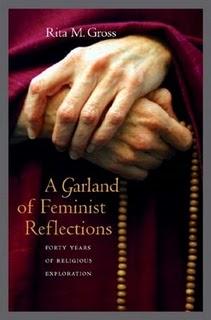A Garland of Feminist Reflections: Forty Years of Religious Exploration

Preeminent feminist Buddhism scholar Rita M. Gross’ A Garland of Feminist Reflections is an indispensable collection of her best collected writing from the past forty years. Drawing together theory, philosophy, and religious exploration, Gross’ self-selected anthology is deeply thought provoking and can serve as an introduction to her vital scholarship, or a necessary refresher on important concepts and ideas. Among the pieces she chose, Gross included several groundbreaking essays on methodology and theory. The collection also includes large sections of Gross’ writing on feminist theology and Buddhist feminism.
Gross’ writing is strikingly beautiful, though it is also a dense read—and a complicated one—for anyone not already deeply engaged with comparative religious studies or knowledgeable about Buddhism and gender in an academic framework. This isn’t a criticism, but speaks to Gross’ passionate relationship with her work. Some essays, such as “What Went Wrong? Feminism and Freedom from the Prison of Gender Roles,” offer more accessible insight into how gender affects our very existence. Thirty years after the beginning of the second wave of feminism, Gross argues that in many ways, we are no better off than we were before. Still confined to the prison of gender roles, we’ve only become more appreciative of the male gender and increasingly more competitive and materialistic than before.
While Gross’ academic work is reason enough to pick up this collection, the personal essay, which begins the book, highlights the unique challenges she continues to face as the most renowned feminist Buddhist theologian of our time. An introspective woman from a conservative home in Wisconsin, who came of age in the 1950s, Gross is the unlikeliest of comparative religious scholars. Her deeply moving personal essay, “How Did This Ever Happen To Me?” is heart wrenching and inspiring in its detail of her battles against the male-dominated academy, small school academics uninterested in intellectual debate, and a world simply unable to understand a radically peaceful woman much more interested in cultivating her mind than anything that could grow in her womb.